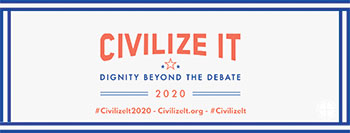Week 4: ‘Pray, Learn and Act as Faithful Citizens’
 Compiled by the archdiocesan Office of Human Life and Dignity and Catholic Charities-Social Concerns
Compiled by the archdiocesan Office of Human Life and Dignity and Catholic Charities-Social Concerns
The archdiocesan Office of Human Life and Dignity and Catholic Charities-Social Concerns are collaborating to offer the fourth of seven weeks of prayer, study and action as the nation prepares for an upcoming election.
This week, we will continue to explore the teaching document from the United States Conference of Catholic Bishops (USCCB), “Forming Consciences for Faithful Citizenship,” which “provides guidance for all who seek to exercise their rights and duties as citizens.” We will take a brief look at the second section of the bishops’ statement.
Pray
Holy Spirit, we praise and thank you! You anoint us to bring glad tidings to the poor, proclaim liberty to captives, recover sight for the blind, free the oppressed and build communities in keeping with God’s vision of justice. Show us how to be light of the world, salt of the Earth, seeds that sprout love and leaven that infuses humanity with the desire to promote human dignity and solidarity. Help us to listen so that those in poverty can lead our efforts to proclaim a more hopeful vision, liberate captives from injustice heal the blindness of the powerful, free us all from self-centeredness and build community to overcome poverty. Amen.
(cutt.ly/USCCBPrayer)
Learn
The following excerpts are from “Forming Consciences for Faithful Citizenship” Part II: Applying Catholic Teaching to Major Issues: A Summary of Policy Positions of the United States Conference of Catholic Bishops:”
“Politics is a noble mission to promote the common good. As such, it is about ethics and principles as well as issues, candidates, and officeholders. To engage in “politics,” then, is more than getting involved in current polemics and debates; it is about acting with others and through institutions for the benefit of all. The fact that much of our political rhetoric has become very negative, and that political polarization seems to have grown should not dissuade us from the high calling to work for a world that allows everyone to thrive, a world in which all persons, all families, have what they need to fulfill their God-given destiny. In our democracy, one aspect of this task for all of us requires that we weigh issues and related policies.
“While people of goodwill may sometimes choose different ways to apply and act on some of our principles, Catholics cannot ignore their inescapable moral challenges or simply dismiss the Church’s guidance or policy directions that flow from these principles.”
Space does not permit us the opportunity to quote each issue at length, but we cannot urge you strongly enough to review “Forming Consciences for Faithful Citizenship” for yourself in order to discern your vote.
The following is a list of the issues that the document addresses in greater detail, and the paragraphs where you might find information on each.
-
Human Life: #64-67
-
Promoting Peace: #68 and #69
-
Marriage and Family Life: #70 and #71
-
Religious Freedom: #72
-
Preferential Option for the Poor and Economic Justice: #73-79
-
Health Care: #80
-
Migration: #81
-
Catholic Education: #82 and #83
-
Promoting Justice and Countering Violence: #84
-
Combatting Unjust Discrimination: #85
-
Care for Our Common Home: #86
-
Communications, Media, and Culture: #87-89
-
Global Solidarity: #90
Act
After a thorough reading of part two of “Forming Consciences for Faithful Citizenship,” sign up to participate in national Catholic advocacy campaigns, find your official representatives, find legislation, and sign up for the newsletter at the USCCB Action Center at www.votervoice.net/usccb/home. For local Catholic issues and to receive updates and action alerts for statewide issues from the Indiana Catholic Conference, go to www.votervoice.net/INDIANACC/home. †
